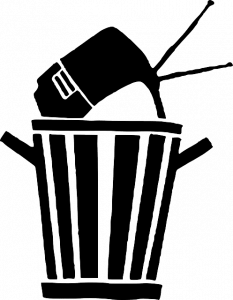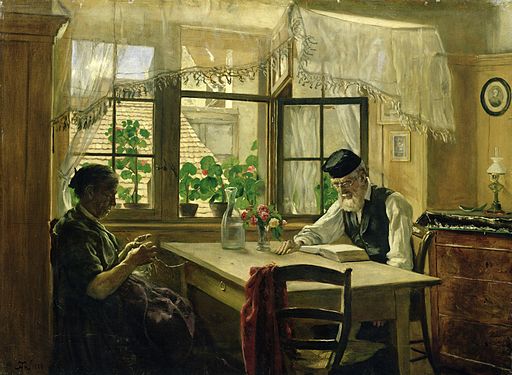This post was originally published over five years ago, but it echoes a book I am currently reading (or possibly the book echoes the post – they were published in the same year). In Digital Minimalism, Cal Newport writes, “you’re more likely to succeed in reducing the role of digital tools in your life if you cultivate high-quality alternatives to the easy distraction they provide. For many people, their compulsive phone use papers over a void created by a lack of a well-developed leisure life.”
Oof.
I feel Past Me provided some good advice here for Present Me on how to not get sucked into the small screen. So, bearing in mind that we’re not just talking about TV here, how do you live without TV?
- Remove TV from house; delete all TV-related tabs, apps etc.
- Ta-da! You are living without TV.
Except what we really want to know is not how to live without TV, but how to thrive without TV. (Side note: if English was a more sensible language, that would have rhymed and been an all-around more catchy sentence.)
So how does one do it? I had an epiphany the other night while reading a book about procrastination. The epiphany was this: There is only one way to find time to do something, and that is to not do something else.
Deep, yes? And, if you turn it around, relevant. The only way to stop doing something is to find something else to do with that time. Because while you could, technically, decide to spend your habitual TV hours staring at the wall instead, you are going to need some industrial-strength will-power to make that happen. (Unless you are a cat, in which case it probably comes naturally.)
Similarly, you will also need a fair amount of will-power if you want to replace TV-watching with scrubbing the tile grouting, or an in-depth study of the philosophies of Kant. Because the reason we waste time staring at screens is not generally because we simply can’t think of anything else to do with our time. It’s because we don’t much fancy the alternative, even if we are peeved with ourselves for wasting the time, and aware that it isn’t a healthy habit.
The solution, then, is to find something else that you would enjoy doing instead of idiot-boxing. The options here are many and various – indeed, practically unlimited. Acquire a dog and take it for walks. Learn Welsh. Take up wood-carving. Reproduce the Sistine Chapel ceiling on the inside of the shed roof. The important thing is that it be something more enjoyable – for you – than staring slack-jawed at the boob tube.
The Caped Gooseberry and I haven’t had TV for four or five years now. Nor do we have any of those subscription thingies that allow you to watch TV on your computer. Added to which, our computers don’t have speakers, which downgrades the whole experience somewhat.
I admit, there are times when I wish we had TV, but not very often. Generally it works out at about one and a half times a year – once a year for the Royal Variety Show, and once every other year for the Commonwealth Games and the Olympics. Doesn’t really seem worth getting TV just for that, does it? We do, however, have a screen attached to a DVD player – because stories are my cup of tea! – and we officially watch things on the weekends (except often we don’t).
So how do our evenings pass? For one thing, we read to each other. There’s nothing quite like curling up by the fire with a hot drink to hand, listening to a fine tale unroll in the voice of your beloved. In the nearly eight years we’ve been married, we’ve read 95 books to each other, with another two (or five, depending on how you count them) underway.
Generally, one of us will read while the other does handwork. This usually takes the form of knitting (for either of us), or crochet and quilting for me, along with other odd jobs like mending, ironing and chopping up apples for crumbles (or cider).
Our other evening pastime is playing games. Quiddler was a constant favourite for a year or so, overtaken a few months back by Phase 10. And I’m always keen on Trivial Pursuit – we have four sets of questions now, although two are as old as me and therefore don’t get used much. (If the question is about an American politician, answer Ronald Reagan; if Australian, answer Gough Whitlam.)
Of course, this cheerful domesticity may not be at all the way of life that appeals to you, and that’s fine. Maybe parkour or flyting is more your cup of tea. But know this: I no longer rise late at night from my couch with the dissatisfied feeling that I’ve wasted another handful of my life – on something that served no other purpose than to move me unthinkingly from then to now.
The sands of life run fast enough as it is. Why waste them on what does not satisfy?




Not sure if this helps, but there is a middle path with TV. And that’s to not ever watch it live. While I was a holdout for a long time about having a VCR, once I did get one I quickly changed to time-shifting programmes rather than watching them at time of broadcast. Indeed, when I met my partner 25 years ago, she saw great value in this and we have almost never watched anything live ever since.
The tech side of things has changed, from analog broadcasts to digital, from videocassettes to recordable DVDs and now to “ts” (transmission stream) files.
A week’s worth of TV is scanned in the weekly newspaper and a set of recordings scheduled. A database tracks what’s in the watchable stock.
But the main purpose of all of this, is that watching things is entirely a matter of what and when we feel like watching. In my mind, it converts video content into being like the world of books, which wait patiently on shelves waiting to be read.
(Well, on my shelves they wait thus, plus often re-read as it is mostly non-fiction as a precious hoard from the pre-Internet era. Her shelves by comparison are the perennial comings and goings from four different library services – as is a Librarian’s wont – and is equally fiction and non.)
A library of AV stories is an excellent thing to have! The main thing is to avoid “stare at what’s there” as a default instead of doing things intentionally.